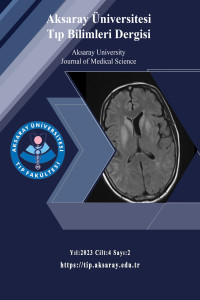Serotoninin Adipoz Doku Kökenli Mezenkimal Kök Hücrelerin Proliferasyonuna Etkisinin Wnt-β Sinyal Yolağı Üzerinden İncelenmesi
Abstract
Amaç: Hücresel tedaviler açısından mezenkimal kök hücreler (MKH’ler), sahip oldukları özellikler nedeniyle en çok çalışılan hücrelerin başında gelmektedir. Özellikle klinik çalışmalarda MKH’lerin devamlılığı önemlidir. Wnt sinyali, MKH'lerin çoğalması ve farklılaşmasının düzenlenmesinde hayati bir rol oynar.
Materyal ve Metot: Bu çalışmada adipoz doku kökenli MKH’lerin (AD-MKH’lerin) proliferatif özelliği üzerine Serotoninin (5-hydroxytryptophan [5-HT]) etkisinin Wnt-β sinyal yolağı üzerinden araştırılması amaçlanmıştır. Çalışmada AD-MKH’ler kullanıldı. İlk olarak, Serotoninin 1-100 µM arasında değişen konsantrasyonlarının AD-MKH’lere etkisi MTT testi ile analiz edildi. Hücreler üzerine apoptotik etkisi Annexin V/PI ve analizi ile belirlendi. WNT2, AXIN ve CTNNB1 genlerinin ekspresyon düzeyleri moleküler düzeyde qPCR ile analiz edildi. Bulgular: MTT analizi sonucu 48. saatte 75 µM serotoninin proliferasyonu azalttığı gözlendi. 48 saatlik 75 µM serotonin uygulaması sonrası apoptotik hücre oranı %2.05’e çıkarken, erken apoptoz evresindeki hücre oranı %0.77 olarak tespit edildi. WNT2, AXIN ve CTNNB1 gen ekspresyonlarının kontrol grubu ile karşılaştırıldığında, WNT2 ve AXIN up-regüle olurken (p<0.05) CTNNB1 ekspresyonunun ise serotonin uygulanmış hücrelerde down-regüle olduğu belirlendi (p<0.01).
Sonuç: Sonuçlar serotoninin mezenkimal kök hücrelerin proliferatif etkisini Wnt sinyal yolağı üzerinden artırabildiğini göstermektedir. Ancak in vivo ve ileri moleküler düzeyde çalışmalarla desteklenmesi gerekmektedir.
References
- Sevimli M ve Sevimli TS. Embriyonik Kök Hücrelerde Wnt Sinyal Yolağı. DEU Tıp Fakültesi Dergisi. 2016;30(1).
Investigation of the Effect of Serotonin on Proliferation of Adipose Tissue-Derived Mesenchymal Stem Cells via Wnt-β Signaling Pathway
Abstract
Aim: Mesenchymal stem cells (MSCs) are among the most studied cells due to their properties in terms of cellular therapies. In particular, the continuity of MSCs is essential in clinical studies. The Wnt signal plays a vital role in regulating the proliferation and differentiation of MSCs. In this study, the effect of serotonin (5-hydroxytryptophan [5-HT]) on the proliferative properties of adipose tissue-derived MSCs (AD-MSCs) was investigated through the Wnt-β signaling pathway.
Materials and Methods: AD-MSCs were used in the study. Firstly, the effect of serotonin concentrations ranging from 1-100 µM on AD-MSCs was analyzed by MTT test. The apoptotic effect on the cells was determined by Annexin V/PI analysis. Finally, the expression levels of WNT2, AXIN, and CTNNB1 genes were analyzed at the molecular level by qPCR.
Results: The MTT analysis revealed that 75 µM serotonin reduced proliferation at 48 hours. After 48 hours of treatment with 75 µM serotonin, the apoptotic cell rate increased to 2.05%, while the early apoptotic cell rate was determined as 0.77%. When compared with the control group, WNT2, and AXIN gene expressions were up-regulated (p<0.05), while the CTNNB1 expression was down-regulated in the cells treated with serotonin (p<0.01).
Conclusion: The results show that serotonin can increase the proliferative effect of mesenchymal stem cells through the Wnt signaling pathway. However, further in vivo and advanced molecular studies are required to support these findings.
References
- Sevimli M ve Sevimli TS. Embriyonik Kök Hücrelerde Wnt Sinyal Yolağı. DEU Tıp Fakültesi Dergisi. 2016;30(1).
Details
| Primary Language | English |
|---|---|
| Subjects | Clinical Sciences |
| Journal Section | Research Articles |
| Authors | |
| Publication Date | September 30, 2023 |
| Submission Date | May 17, 2023 |
| Acceptance Date | August 7, 2023 |
| Published in Issue | Year 2023 Volume: 4 Issue: 2 |


